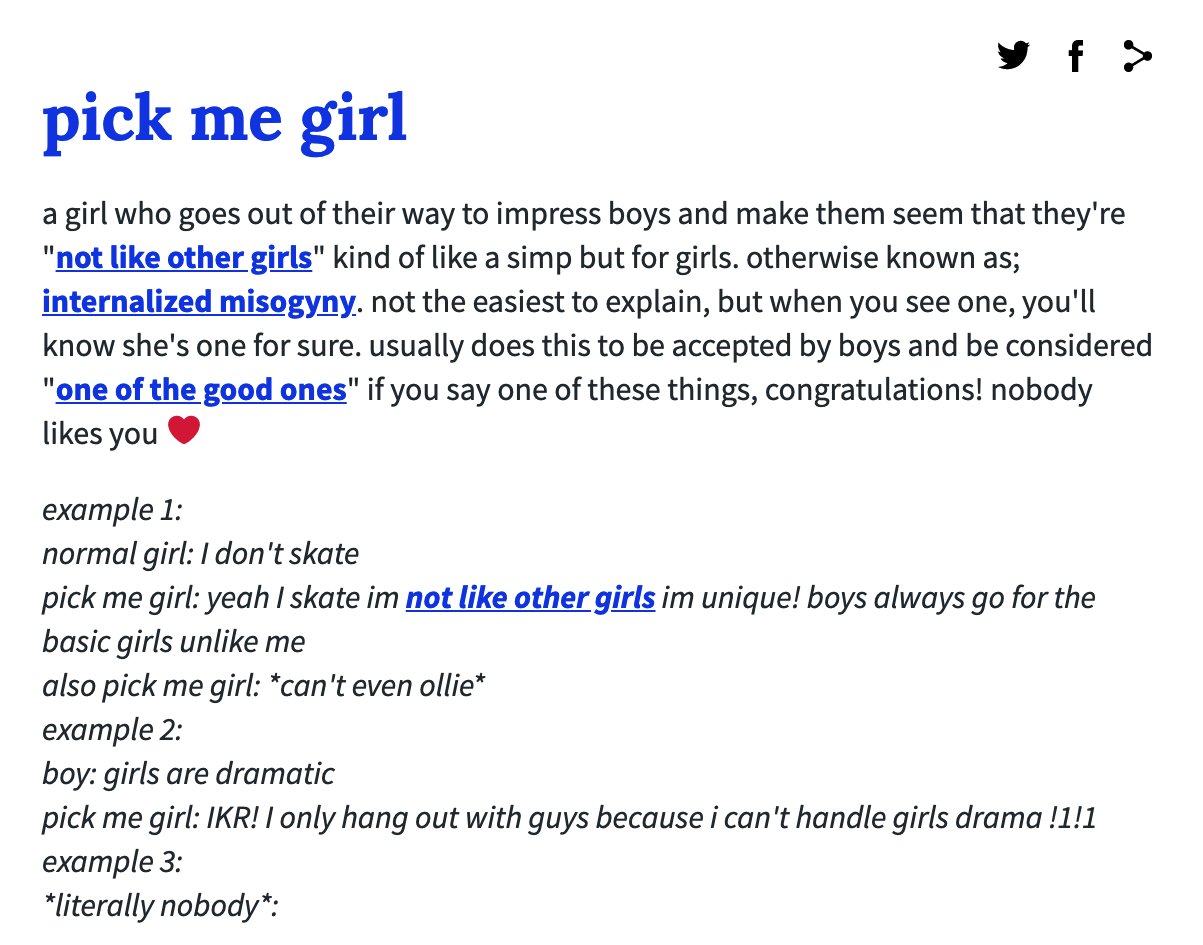By Elio Wilder (they/them)
Many feminists I know were born believing in equality. But few grew up knowing how to articulate this. And many had a long and winding journey to come to a place of proudly calling oneself a feminist.
But before arriving at that place of like-minded people passionate about equality, I like many others, had an “I’m not like other girls” phase. (Turns out I’m not a girl but that’s a story for another time). The modern term for this phenomenon is a “pick me girl”. Let’s unpack.
‘I’m not like other girls!’ Image: E.Wilder via canva.
An imitation of a “pick me girl” can also be found here
The logic is fairly simple. You notice femininity is viewed negatively and this leads to you being treated as inferior. So in order to escape this treatment, you distance yourself from feminine stereotypes and archetypes. You rise above the inferior feminine “other girls”. You’re not like them. You’re cooler than them.
But on closer inspection, it’s not femininity that’s the issue. The problem lies in the belief that femininity is bad or inferior. And gaining a sense of superiority over other women by distancing yourself from femininity, is a result of internalised misogyny.
Internalised misogyny is when the hatred of women, and things associated with women, turns inwards. One is no longer aware that their thoughts or actions stem from misogyny, because it has become so deeply, yet covertly, ingrained. Misogyny and misogynistic beliefs are promoted and normalised by the structure of men in power, with the intention of maintaining this power imbalance (patriarchy).
Many feminists experience the “I’m not like other girls” phase in an attempt to escape misogyny, but in doing so, are actually perpetuating it. This is because they are further contributing to the notion that femininity, and those who participate in it, are inferior.
More recently the term “pick me girl” has become more popular, and is more accurate in its presentation of this issue. The “I’m not like other girls” mindset is no longer presented as cool or superior to traditional femininity, but instead as the desperate and even tragic “pick me”. Tragic in that the “pick me” is a victim of internalised misogyny, which is more directly acknowledged by this more modern label. The rejecting of femininity is an attempt to be accepted (picked) by the power holders (men) in society. And I’m glad this is now being labelled negatively to reflect the harmful effect of trying to be accepted at the expense of other women and women-aligned people.
The term “pick me” is more broadly used when people (usually of a marginalised group) reject a facet of their identity in order to be accepted by the relevant power holder (whether that be straight people, white people etc).
The contrast between the “pick me girl” and the feminist can be seen in the songs “Pretty Girl” by Maggie Lindemann and “Most Girls” by Hailee Stienfeld. They were both released in 2017, and I found it slightly amusing to hear them played on the radio back to back. Lindemann’s “If I drink if I smoke, I keep up with the guys… f*ck your ribbons and your pearls” was quite the contrast to Steinfeld’s “Most girls are smart and strong and beautiful…. I wanna be like most girls”. In the first song, the singer distances herself from other women and femininity (and instead brags about masculine traits), whilst the latter embraces other women, diversity, choice, and solidarity. What I’m saying is, skip the first song. You don’t need validation from men, and you don’t need to distance yourself from women, and women-associated things to feel worthy and accepted. You can embrace your own power by uniting with women and women-aligned people. Femininity is not inherently negative. Nor is it inherently female. After all, the external manifestation of gender is a social construct. And the term “feminine”, which describes things historically associated with women, is becoming increasingly inaccurate as society dismantles the gender binary.
Understanding that the idea of femininity being inferior is perpetuated by the patriarchy, with the intent to maintain the subservience of feminine-presenting people in society, is a crucial step in your feminist journey.
As a brief side note, it is not feminist to mock a “pick me” either. A “pick me girl” only wants to be accepted in a world that is structured against her. Her motivation is valid but her execution fails her. As feminists, we must give others the opportunity to learn and grow. To degrade a “pick me girl” would be to exhibit the same behaviour that degrades femininity in the first place. Ultimately that person is a victim of internalised misogyny and the better thing to do is help them question where those beliefs came from.
Ultimately, I am glad to see the next generation thinking critically about what we have been taught to believe about femininity and question who this truly benefits. And more importantly, to not compete for male validation at the expense of our misogyny-affected peers and to instead stand united in the fight for equality.


